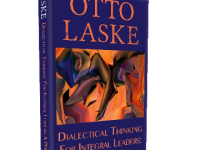Solving real world problems tests professionals’ present level of cognitive development. A good training ground for working on hard problems in teams is the Case Study Cohort Method (CSCM) developed at the Interdevelopmental Institute. The method consists of a having members of a team assessing an individual’s or team’s level of cognitive maturity debate the empirical evidence that speaks in favor of one or the other level of subjects’ cognitive flexibility. Although the material for the debate is “academic”, consisting of a transcription of a 1-hr cognitive interview, the opportunities for sharpening one’s use of dialectical thought forms is the same as in a real-world situation in which an individual or team is looking for solutions. In this paper, I describe both the method and show what it entails to learn to use dialectical thought forms, envisioning that such use could become a social practice with major benefits for solving global economic and political problems. (A reprint from Integral Review 11, no. 3, 2015). DTF as a Tool for Creating Integral Collaborations Read More...
Category: Cognitive Dimension
CDF as a Talent Finder and Work Design Methodology
In this article, I highlight the resources of the Constructive Developmental Framework (CDF) for finding and retaining organizational talent and designing a work environment that supports shared leadership. CDF as a Talent Finder and Work Design Methodology Read More...
Contributions to Evidence Based Developmental Coaching
This article describes a constructivist approach to coaching based on the Constructive Developmental Framework (CDF). Such coaching is evidence based, i.e., based on empirical assessments of coachees prior to actual coaching. Coaching plans are based on empirical findings about coachees' present frame of reference (the way they see the world), meant to guide them toward a more lucid understanding of themselves and their work, and toward more complex thinking. The article appeared in the International Review of Coaching Psychology, London, UK, in 2007, and is here reprinted because it helps behavioral coaches understand the limitations of their professional work. Contributions of Evidence Based Coaching 2007 Read More...
Nick Shannon on “What Can IDM Offer the Integral Movement?”
In this article, written in response to the 2nd ITC conference (2010), Nick Shannon outlined four main vantage points from which teachings at the Otto Laske Interdevelopmental Institute (IDM) elucidate and strengthen integral thinking: (1) upper left quadrant, (2) dialectical unfolding of concepts, (3) moving from contextual to transformation language, and (4) cognitive development and higher levels of consciousness. Shannon thought that in all of these regards, Otto Laske's teaching clarifies and advances integral thinking. To this day, the promise of this teaching, more recently reinforced by Bhaskar's dialectical writings (1990s), has remained largely unknown or unnoticed. We are reprinting N. Shannon's thoughts here to invite further engagement of integral practitioners with dialectic, a recent topic of Laske's book entitled "Dialectical thinking for integral leaders: A primer" (Integral Publishers, 2015). Shannon, What can IDM offer the Integral Movement Read More...
Executive Development as Adult Development
This article, chapter 9 of Demick et al’s Handbook of Adult Development (Springer 2002), tries to escape the tunnel vision of organizational theorists and consultants alike who, while glorifying leaders, cannot penetrate to the adult-developmental origins of leadership and get lost in psychological or spiritual speculations, or else lists of competences. Instead, the article adopts the distinction between "ontic" and "agentic" development, that is, the development that happens over human resources' life span development, on one hand, and the organizational mechanisms put in place to "develop" them, on the other. The article conceptualizes executive development as a lawful developmental modification of an individual's professional agenda and universe of discourse in the cognitive and social-emotional sense or, to speak with E. Jaques, his/her Size of Person. Refining Argyris, three levels of professional agenda are distinguished. M. W. McCall Jr.'s (1998) and D. T. Hall's writings (1996) are focused on in order to clarify contemporary theorists' views, referring to McCall's "five dilemmas" of human development in organizations. The article focuses on the dialectic of managerial strengths and weaknesses, the organizational shift to the "Proteian" (internal) career, and introduces Kegan's and Basseches' work alongside with empirical findings of the author. Laske, Executive Development... Read More...
Foundations of Scholarly Consulting: The Developmental Structure/Process Tool
This article of 2000 deepens Argyris’ notion of theory-in-use by recourse to empirical findings of the developmental sciences. It defines "consulting" based on this deeper notion. The article teaches a lesson still not learned in consulting: that theory-in-use has to do with levels of mental growth, both cognitively and social-emotionally, cutting through all "competence models". Consulting is redefined as the interactive design of interventions that take the level of mental growth of organization members and of their culture into account, equally in start-ups. Theory-in-use itself [what people actually do in organizations] is seen as comprising both a structural [social-emotional] aspect, referred to as individuals’ level of evolving self, and a procedural [cognitive] aspect, represented by individuals’ level of complexity handling. Their integration and unity demystifies "consciousness" as well as "leadership". In the process, the Developmental Structure/Process Tool (DSPT) – since 2005 referred to as CDF, Constructive Developmental Framework -- is introduced as an instrument of evidence-based consulting and coaching. CPJ #2, 2000. Read More...

